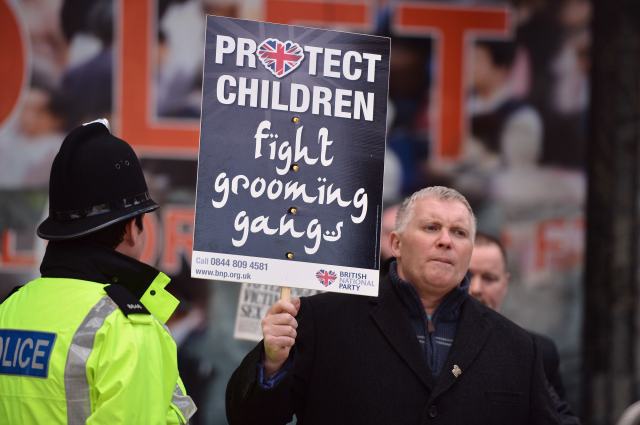The far right monopolised the debate about ‘grooming’ cases. Credit – Christopher Furlong/Getty

I think we might have to invent a new political term. It is to describe an issue of importance, but one that you have decided not to engage with – or may even have denied is an issue – because those already interested in it are not people you are sympathetic to. Or, to refine matters: because the people who were first on the scene with answers are people with the worst possible answers. (I’m pretty certain the German language would come up with a phrase that would catch it superlatively.)
By way of example, a confession. Over the years since the 2008 financial crash, there has been growing discussion about ‘inequality’ in Western societies. The work of Thomas Piketty and others gave ammunition to the cause, and the word is now weaponised by the Left in almost every political debate and context. Ten years ago, you would find me denying that inequality was any type of problem: “a product of the free market”, I would have said. “There has always been inequality.”
Over the past decade, though, one aspect of this inequality has become especially acute. It is the inability of young people to get onto the housing ladder and the fact that this is being reflected in youth voting patterns. People without capital don’t have much stake in capitalism, and people who cannot enter the housing market would appear to be losing faith in the free market.
At the same time, the welcome given to oligarchism in places such as London (as described in Oliver Bullough’s eye-watering book ‘Moneyland’) has been warping prices to stark effect. We are living in a strange phase in capitalism that I sometimes think of as ‘Everyone can afford to eat out but no one can afford to eat in (a house they own)’.
I realise now that I was enormously resistant to conceding any points on ‘inequality’ not because I didn’t think there was something going on, and not only because the area isn’t one of my areas of specialism, but because I knew that the people lurking in the wings with the answers were people with the worst answers imaginable. It seemed clear to me from the start of the financial crisis (especially as events unfolded in Greece) that the people waiting to answer concerns about ‘inequality’ were basically Marxists.
They wanted to highlight inequality because they wanted to replace capitalism. Specifically, they wanted to give socialism, or one of its derivatives, another whirl. It’s possibly wise to resist engaging with such political gambits in the short term – at least until you have gathered together your own intellectual and political counter-forces. But it’s a mistake to ignore an issue in the long-term simply because the people waiting with the answers have the worst answers. The free-market across Europe is now in a serious state of disadvantage for having been so slow to respond to the worsening problem.
This set me wondering about other issues which suffer from the same problem. The most obvious is immigration (which is the subject of a debate co-hosted by UnHerd this week). Today it is acceptable for mainstream politicians and pundits of Left and Right to highlight some (though not all) concerns about immigration. But people ask why it has taken such a long time for respectable figures to make their voices heard and to give voice to concerns of the general public.
From the late 1990s onwards people could see a range of problems developing (from integration to security) but they didn’t speak up, or they spoke incredibly carefully. Or they spoke out most loudly to condemn those who were highlighting the issue.
For a very long time, the subject was best avoided. Not only because it carried career risks. But also because many of the people waiting to benefit from a widening of the discussion were people with the worst possible answers.
Take the grooming gang cases that emerged in the first decade of this century. It is now a matter of record that broadcasters and politicians avoided the issue because they worried that to focus on it would only give an advantage to the British National Party and their ilk. As a result, these cases were ignored or played down for years. Today, incidents are still being revealed.
It was clearly deeply unwise to allow the BNP to set the parameters of the argument in the case of grooming gangs. Just as it was unwise to allow Marxists to drive the debate after the financial crisis. And it was unwise for people across the political spectrum to fail to get to grips with questions of immigration for fear that the only people waiting with answers were people waiting with the worst possible answers.
So there are two things that come from this. The first is my ongoing search for a word to define this phenomenon (suggestions on a postcard, please). The second is a reflection of how unwise it is to duck issues simply because you do not want to concede any ground to your political opponents.
Imagine what might be improved in politics if, instead of being directed by a fear of giving fuel to your enemies, it was driven instead by a desire to address and solve problems.










Join the discussion
Join like minded readers that support our journalism by becoming a paid subscriber
To join the discussion in the comments, become a paid subscriber.
Join like minded readers that support our journalism, read unlimited articles and enjoy other subscriber-only benefits.
Subscribe